Liposuction & Liposculpture Surgery in London United Kingdom by Mr Mark Gittos Plastic Surgeon
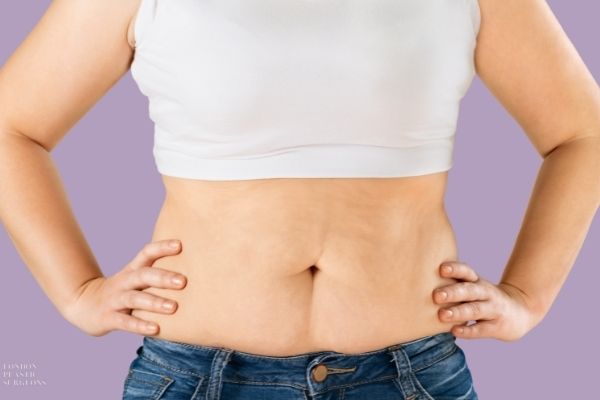
- Do you have Pockets of stubborn Fat?
- Areas of Fat that remain after exercise?
- Want to remove fat that diet can’t shift?
We all have a natural tendency to accumulate fat in some areas of our bodies, and sometimes it cannot be removed purely through exercise or diet. Liposuction is the most common body contouring procedure, and an effective way of removing unwanted fat deposits and bulges. In contrast, where there are unwanted body contour depressions liposculpture by fat transfer will often restore a smooth figure for the patient.
Mr Mark Gittos is a Consultant Plastic Surgeon that is an expert at Liposuction Surgery and Liposculpture in London, United Kingdom.
Watch Mr Mark Gittos explain Liposuction Surgery for Stubborn Fat Removal
What is Liposuction?
Liposuction is a surgical technique that improves the body’s contour by removing excess fat from deposits located between the skin and muscle. It involves small incisions to insert a cannula to suction out the fat cells (but before that occurs, the area is injected with a special fluid that makes fat reduction easier). The fat reduction is considered very long term although you still have remaining fat cells that can become enlarged if you gain weight.
There’s also some research that indicates new fat cells may be created at different stages of life (it is generally, however, believed that fat cells may be quite stable for most of your adult life). Ask your Surgeon for his opinion and knowledge of this area and do your homework. In general, however, you can detrimentally impact your liposuction surgery results if you don’t adhere to a healthy eating regime and regular exercise.
Weight gain, medication effects, pregnancy or menopause or andropause can all lead you to gain weight, which will impact your liposuction results.
If you look in your mirror and all you can see is bulges where you don’t want them, then liposuction (or liposculpture surgery) may be something to think about exploring. It works best when you are fit and healthy and maintain a stable weight; and it can help to smooth out or reduce certain areas of the body – such as reducing thighs, breasts, arms or hips and tummy areas.
But Liposuction is not an easy answer to managing excess weight. It ideally should be used only for stubborn areas of body fat and small bulges that are hard to shift with less invasive approaches, such as diet and exercise changes. We strongly encourage you to get fit and healthy before you consider liposuction body contouring in London.
Am I a Good Candidate?
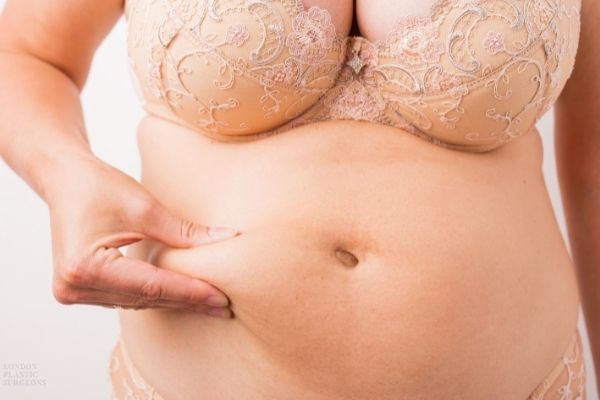
- You have toned up in the gym
- You have achieved a stable and normalised weight
- You are still unhappy with your body shape
- You have bulges in specific areas or too much fat in a few specific locations on the body
- If you are generally at a good weight but you are still unhappy with the shape of your body, then liposuction may be a good option to improve the appearance
Then you may be a good candidate for Liposuction.
What are the Benefits of Liposuction?
Liposuction body contouring is often sought by patients to reduce areas that are prone to storing excess fat that has been resistant to exercise and good nutrition.
Some popular locations for liposuction body contouring include:
- Thighs
- Hips
- Tummy
- Arms
Your own proportions are enhanced or sculpted by reduction of fat. Have smoother contours in clothes or swim wear. Liposuction of the thighs may reduce chaffing for some patients
Success depends on the condition of the skin. If you have lax skin or excess skin, you may require a combined liposuction and excision procedure such as cosmetic plastic surgery.
Liposuction Before and After Photos
Visit our London clinic to see more ‘real patient’ Liposuction before and after surgery photographs, performed in Accredited London Hospitals by our highly experienced Specialist Plastic Surgeon.
CLICK HERE to see more Real Patient Before and After Photos of Liposuction Surgery by Mr Mark Gittos
The Liposuction Surgical Procedure
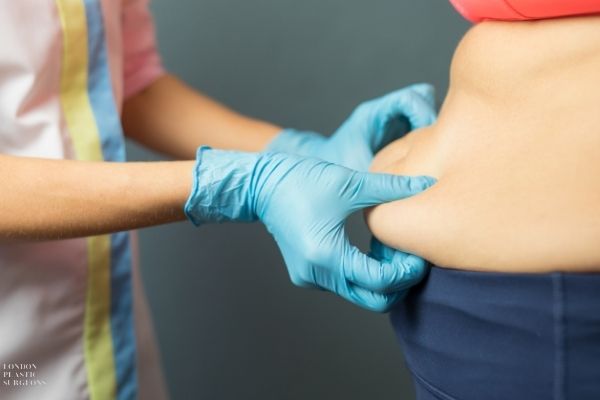
Your operation will be performed under general anaesthetic, and involves one or more tiny incisions depending on the size of the area being treated.
A special liposuction machine and handpiece as well as a slender suction tube are then used to carefully remove the unwanted fatty deposits. The procedure normally takes around one to two hours.
Liposuction involves the use of a small stainless steel tube, called a cannula (from the Latin word for reed, tube, cane). The cannula is connected to a powerful suction pump. This cannula is inserted into the excess body fat through small incisions made by your surgeon into the skin. Fat removal is accomplished as the suction (from the cannula) creates tiny tunnels through the fatty layers, reducing those fat cells. After surgery, these tiny tunnels collapse as healing occurs, resulting in an improved body contour.
Initial recovery times range from a few days to seven to 14 days. It really varies from person to person.
For some people with very light duties, they can be back to work in as little as a week following their procedure. Others will need at least 2 weeks to feel comfortable working again; and some discomfort after liposuction can remain for several months as you fully heal.
Risks and Complications of Liposuction
Choosing a certified highly experienced surgeon significantly reduces your risk of pre and postoperative complications. As with any surgery, liposuction carries risks, such as bleeding and reaction to anesthesia.
Possible complications specific to the liposuction procedure include:
- Infection– Skin infections are rare, but possible. Severe skin infections might be life-threatening. It is important to report any inflammation or redness around the site of treatment. These signs may indicate a more complex infection that can spread to the rest of your body. It is important to carefully follow all pre and post-surgical instructions.
- Numbness– Temporary or permanent numbness in the affected area may occur. Temporary nerve irritation is also possible.
- Fat Embolism-It is important to adhere to all postoperative instructions. Compressive garments are a vital aspect of your recovery period. Failure to adhere to these instructions can lead to complications such as deep vein thrombosis, pulmonary embolism, and even death.
- Bruising– Hematomas (bruises) can occur when an increased amount of bleeding is present. It is important to make sure you and your surgeon choose the correct type of liposuction based on your specific needs, to decrease the risk of post-treatment bleeding.
- Contour irregularities– Often a result of poor technique (uneven fat removal) your skin may appear bumpy, wavy or even withered. Poor skin elasticity and unusual healing patterns can also cause these changes, which may be permanent. Damage beneath the skin from a thin tube (cannula) that’s used during liposuction might also give the skin a permanent spotted appearance.
- Internal puncture– It is rare that a cannula penetrates too deeply. However, without the right experience aggressive treatments can puncture tissues, causing damage to internal organs. Internal puncture might require emergency surgery and can even lead to death.
The risks of complications increase when the surgeon is working on larger surfaces of your body, or even performing multiple procedures during the same operation. Although liposuction is a common and well-tolerated procedure by most patients, it is important that you choose a board-certified plastic surgeon to complete your treatment.
Recovery from Liposuction Surgery
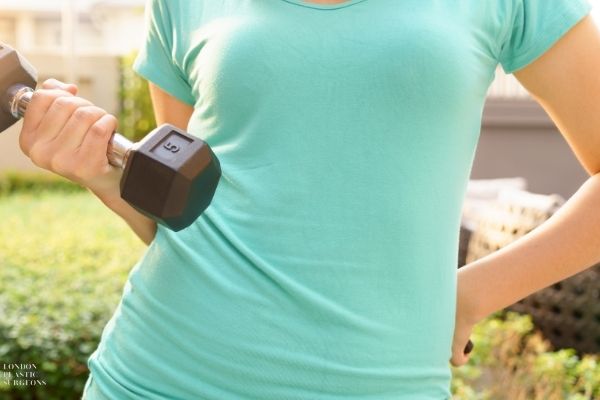
It’s perfectly normal for post-operative swelling to take several weeks to subside after liposuction.
The results of liposuction typically come in stages, varying by individual. You’ll likely see some results immediately after surgery, but swelling and bruising are normal and take weeks to resolve. During this time it’s advisable to wear a pressure garment to minimise swelling, optimise comfort and to speed up recovery. We will of course make sure you have effective painkillers to help with any post-operative pain. Some residual swelling may persist for several months.
It’s also common to have some weight gain due to swelling and the tumescent fluid that was injected. This will resolve over time. Most people see final results six months after surgery, but you may continue to see improvements for up to a year.
Most doctors recommend taking at least a week off from work and your regular routine. Those who undergo a small amount of liposuction may only need a few days. In order to prevent blood clots and discourage swelling, light walking is usually recommended starting the day of surgery. Heavy exercise and other strenuous activities should be avoided for two to three weeks.
The use of a compression garment is often recommended for anywhere from three to six weeks and sometimes longer (sometimes your Surgeon may recommend 8-12 weeks). These garments are beneficial for decreasing the amount of bruising and swelling, and helping loose skin to retract. Some plastic surgeons do not use garments however often the final result is achieved sooner with the use of these garments.
It’s important to follow your doctor’s post-surgery instructions closely to ensure your a safer recovery process and positive surgery results.
And remember: Do not smoke!
What About Scars After Liposuction?
Liposuction involves a series of small incisions less than a centimetre long. Just like scarring from any other type of injury, these incisions will go through a maturation process, likely over the course of a year.
For the first few months, scars may be red and possibly raised and/or firm. As the scar matures, it becomes soft, pale, flat, and much less noticeable. Some people are prone to hypertrophic scars or keloids which are abnormal scars that become prominent. If you or a blood relative have a tendency for these types of scars, please inform your doctor.
Your plastic surgeon may suggest a scar lightening cream, silicone scar sheets, laser treatments, or injections to further minimise the appearance. Use sunscreen and avoid any prolonged exposure to the sun for at least two months, as UV rays can darken the appearance of scars.
Prices & Cost of Liposuction in London UK

The cost of Liposuction is an important factor when considering surgery. The quality of liposuction is more important than the price paid. If the ultimate goal of liposuction is to have a satisfied patient, then the surgeon’s expertise and experience are undoubtedly more important than the price.
Liposuction prices are important but should not be the most important factor when considering lipo surgery. Be careful not to put your body in the “bargain bin”.
Choosing a liposuction surgeon based on the lowest price might ultimately be the most expensive choice if the initial cosmetic results are so bad that another surgeon must be paid to repair the work of the first liposuction surgeon.
How are my liposuction surgery fees calculated?
The total cost for liposuction surgery is the sum of the non-surgical fee plus one or more surgical fees. The non-surgical fees include the cost of the operating room, nursing staff, pre-operative laboratory tests, post-operative garments and supplies. The surgical fees represent the prices for lipo surgery of each individual area.
Factors that determine cost include:
- The size of the patient;
- Amount of time and effort required of the surgeon;
- Cost of anesthesiologist’s services;
- Operating room fees;
- Preoperative laboratory fees;
- Other related expenses, such as elastic compression garments, etc.
- Expected Time And Effort
The expected time and effort that is required to accomplish a liposuction surgery is the most important factor in determining the cost of liposuction. Factors that typically affect the surgeon’s time and effort include:
- Number of areas being treated;
- Size of the patient;
- Anticipated degree of difficulty.
Thus, cost of liposuction of the abdomen alone is less than the cost of doing liposuction on both the abdomen as well as the inner thighs and knees. Similarly, the cost for abdominal liposuction on a patient who weighs over 80 kilos might be more than the cost for liposuction of the abdomen of a patient who has never weighed more than 60 kilos.
Liposuction is more difficult and requires more time if the patient has previously gained and then lost a significant amount of weight. In any area previously treated with liposuction the fat often contains scar tissue which makes surgery in the same area more difficult.
All Surgery is customised and your Surgeon will give you a cost for Liposuction surgery depending on the type of procedure you are having, the hospital you attend and the length of your stay.
At your initial consultation, you are given a detailed quote. This will include your London Plastic Surgeon’s fee, Anaesthetist fee, Surgical Assistant fee and the hospital fees.
We also provide information on Private Health Insurance, a Liposuction payment plan plus other different ways to pay for Liposuction surgery.
How to find a Liposuction Surgeon in London
For many men & women in United Kingdom, having a high definition liposuction or liposculpture is a life-changing experience. There are many qualified surgeons, but it is always best to find one who is experienced in body surgery procedures. Find an experienced surgeon who you feel comfortable with and have a look at their past patient photos. Always seek a second opinion.
Why Choose Mr Mark Gittos – London Plastic Surgeon?
With a wealth of experience and training, Mr Gittos is dedicated to best-practice patient care and education, customising Body Surgery for each and every patient to best meet their needs and desired surgical outcomes.
Mr Gittos has significant body surgery experience and a current FRACS membership
About Mr Mark Gittos FRACS (Plast) – London Plastic Surgeons
Practice locations in London & Essex, UK and Auckland, New Zealand.
Mr Mark Gittos offers high quality, natural-looking cosmetic surgery results and is highly experienced in Breast, Body and Face Surgery having performed over 4000 Surgeries in the last 26 years.
With world-wide expertise Mr Gittos is an expert in breast, face and body surgery for men & women.
Mr Mark Gittos is a leading Specialist Plastic Surgeon and operates a practice in London UK and Auckland New Zealand. His practice focuses on both surgical and non-surgical procedures, each designed to help restore, improve or change a physical characteristic or problem. The first step in every case is to talk through your personal requirements and explore all the options, before deciding on the most effective solution.
Naturally, before any treatment is begun, we will explain clearly the advantages and risk factors; so that you have the information you need to make an informed decision that is best for you. Visit the practice to find out more.
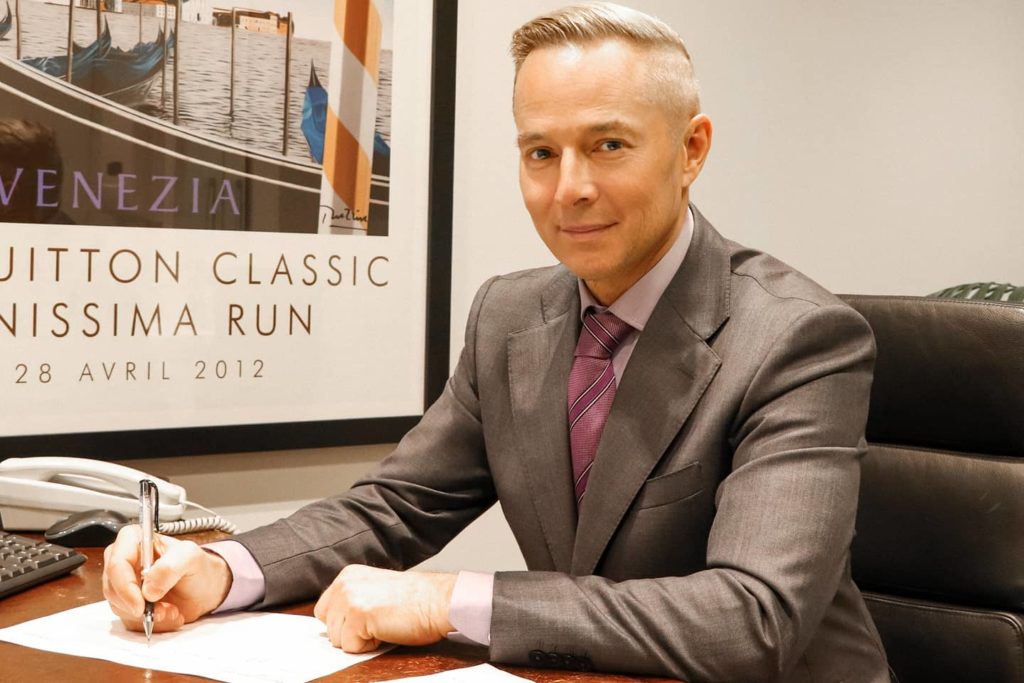
NEXT STEPS
Do your Research
- Read the Website and Blogs relevant to your procedure
- Browse our Frequently Asked Questions including how to choose a Surgeon for your procedure
- Download the Guides to Surgery
What to Bring to your Plastic Surgeon Consultation
- Bring a friend or relative to help discuss the information and your choices
- Take lots of notes and read the documents provided thoroughly
- Want more information before scheduling your consultation?
Book your Initial Surgery Consultation
- A Referral from your GP or specialist is helpful but NOT essential – you can have a consultation without a GP Referral
- Email us or Call in London on 07557 858156 to arrange your surgeon consultation appointment.
- Secure your consultation with Mr Gittos by paying the Consultation Fee in advance
- A consultation with Dr Gittos is £195.
Please contact us to arrange to book a consultation or to speak with our Patient Care Advisor.
Send an enquiry form today or UK phone 07557 858156 during Clinic Hours
